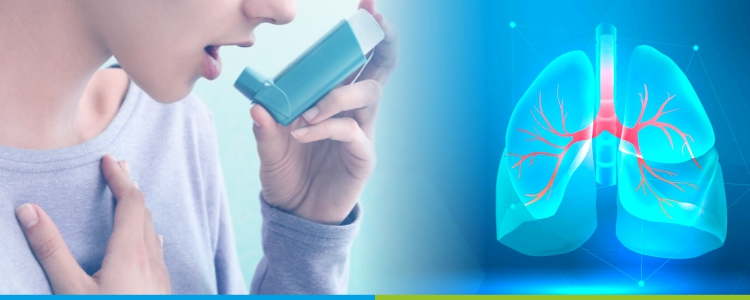With over 5.4 million asthma cases in the United Kingdom, there’s no denying that asthma is one of the most common diseases in the country. This chronic long-term lung disease occurs due to the inflammation and narrowing of the lungs and airways, leading to the production of excessive mucus. Asthma symptoms include shortness of breath, breathing difficulty, coughing, and wheezing. Today, asthma conditions are available at different levels. Patients experience varying symptoms depending on the nature of their asthma sickness. Unfortunately, these symptoms are incurable. Instead, you can only manage the symptoms by using the right medications, such as this Ventolin asthma inhaler.
Studies also reveal that certain people with childhood asthma can grow out of it when they become adults. Asthma affects everybody regardless of age and sex. However, in the UK, this disease is most common among women and children. That said, here’s a quick question; what exactly causes asthma?
Here’s what you should know about the causes of asthma
The history of occupational asthma dates as far back as the 16th century when German physician Georgius Agricola described the connection that exists between environmental factors and airway symptoms. Although asthma conditions have been around for many years, their exact single cause remains unclear.
While asthma has no single cause, experts traced its causes to different factors, including the combination of multiple factors. These factors include certain viral respiratory infections, air pollutants, allergens (outdoor and indoor types), quality of air, and many more.
Genetics and the environment are two other factors that cause asthma. For instance, a person can experience asthma symptoms due to psychological stress. People can also experience asthma due to family history. Sometimes, certain asthma medications can also result in asthma attacks in some people. Also, premature children and kids exposed to tobacco can suffer from asthma.
Warning symptoms of asthma
What exactly are the warning signs of asthma? As earlier mentioned, coughing, wheezing, breathing difficulties, and chest tightness are the most common symptoms of asthma.
Other symptoms include pain, fast heartbeat, flaring, anxiety, throat irritation, breathing with your mouth, etc. All these symptoms can be triggered by certain asthma triggers, such as exercise, stress, laughter, smoke from tobacco, air pollution, allergies, lung infections, beta blocker medications, sudden weather changes, and many more.
Doctors often advise patients to avoid these triggers at all costs. In cases where you need to perform any of the above activities, you need to take the appropriate dose of your asthma Ventolin inhaler before getting started.
What exactly is an asthma attack?
An asthma attack occurs when your asthma condition suddenly worsens. This situation is often caused by a term known as “bronchospasm”. This term means the tightening of the airway muscles.
When asthma attacks occur;

- The muscles around the airways become tight. This ends up narrowing the airway, causing less air to penetrate.
- This constriction of the airway causes inflammation due to the lack of passage of sufficient air.
- This further causes excessive production of mucus, making the airways even narrower.
There are different levels of asthma conditions today. The most common of them is mild attacks, which are pretty easy to control with suitable asthma medication. Severe asthma, which prevents air from penetrating the bloodstream, is rare. Once this happens, try using your Ventolin asthma inhaler. But if the blue reliever asthma inhaler fails to work, you need to call for an emergency immediately.
Tips on how to diagnose asthma
Your doctor is the right healthcare staff to diagnose asthma conditions. To start the diagnosis process, your doctor needs to first get familiar with your symptoms. This explains why patients are often advised to note down their symptoms, trigger factors, as well as the time of their occurrence, for easy diagnosis. This piece of information, together with modern diagnosis tools, such as spirometry and peak expiratory flow (PEF) meter, will help your doctor make an accurate diagnosis of your condition.
After diagnosis, your doctor will most certainly give you a PEF meter to check your peak expiration flow and identify the effectiveness of your Ventolin inhaler asthma medication.
Types of asthma treatments
Two primary functions of asthma treatments are to alleviate the current asthma symptoms and prevent future symptoms. Yes, these treatment options don’t completely cure your asthma symptoms. They only help you manage them to avoid future occurrences.
Speaking of the treatment options; it involves the use of:
- Different types of inhalers, such as this asthma inhalers Ventolin.
- Modification of your lifestyle is another effective asthma treatment.
Types of asthma treatments
- Short-term asthma treatment
- Long-term treatment
Short-term asthma treatment involves the use of short-term medications, which is available as asthma salbutamol and terbutaline. This type of asthma medication helps to provide quick relief to attacks and other severe conditions.
Long-term asthma treatment, on the other hand, involves the use of long-term medications, known as corticosteroids. This comes as a combination of beclomethasone and budesonide. Corticosteroids help to prevent potential asthma attacks.
- Asthma Salbutamol, such as Ventolin and Salamol, helps to provide quick relief to asthma symptoms such as wheezing and coughing. Sal butanol also helps to prevent the potential occurrence of asthma symptoms. This explains why it’s advisable to use the appropriate dose before performing exercise or any activity that requires heavy breathing.
- Terbutaline or Bricanyl offers similar effects as asthma Salbutamol. When used, Bricanyl helps to open up a patient’s narrowed airways. This is exactly how Salbutalmol inhalers also work.
Preventer asthma inhalers
As you already know, asthma is an incurable lung disease that can be managed. The preventer asthma inhalers are designed to prevent future occurrences of asthma attacks. The primary goal of preventers or corticosteroids is to keep your symptoms under control. This asthma medication works by helping you decrease the sensitivity of your airway lining and reduce inflammation and further secretion of mucus.
Preventers, such as Clenil, Qvar, Seretide, and Flixotide feature inhaled steroids and other ingredients. These substances work together to help you treat asthma and keep the condition under control. When used regularly and correctly, they’ll help you address airway inflammation and irritation. When this happens, the chances of an asthma attack occurring becomes reduced.
For better asthma treatment results, doctors often advise patients to use both brown preventers and blue reliever asthma inhalers together. This prescription is most certain if a patient suddenly experiences an asthma attack.
Asthma treatment should only be prescribed by a doctor. The goal is to help you manage your condition and allow you to perform certain activities with your family. It’s not advisable to self-diagnose and treat your asthma condition on your own. After diagnosis, your doctor will also advise you on the best ways to administer asthma medications. The common options available are; MDIs or metered-dose inhalers, nebulizers, and spacers. For effective results, you need to get familiar with the option prescribed by your doctor.
Side effects of asthma medications
Today, asthma medications, such as Ventolin asthma inhalers, can cause different side effects. These effects include headaches, nasal congestion, rashes, dizziness, tremors, muscle cramps, dry mouth, and anxiety. However, you need to understand that most of these effects often surface because of incorrect use of your inhaler. Once you start experiencing any of these side effects, you need to visit your doctor.
Oral thrush or oral candidiasis is another side effect of using asthma inhalers. This effect occurs If you fail to rinse your mouth or brush your teeth after using a preventer inhaler.
Can you prevent asthma?
It’s impossible to prevent asthma. However, with the right doctor-prescribed asthma medication, you can always avoid certain asthma symptoms and attacks. This is also possible with relevant lifestyle modifications, such as avoiding your triggers and allergens. Installation of an effective air filtration system will also help you get the best results.
- Certain light exercises are also effective for helping you avoid asthma symptoms.
- Another effective way to avoid certain asthma symptoms is by visiting your doctor or nurse regularly for checkups.
- Using the right inhaler and technique will also help you do the magic.
- Flu is a common illness that can worsen asthma conditions. Getting vaccinated against the flu can help you get better and avoid serious complications.
The bottom line is that it’s very possible to prevent certain asthma symptoms from affecting your overall health.











